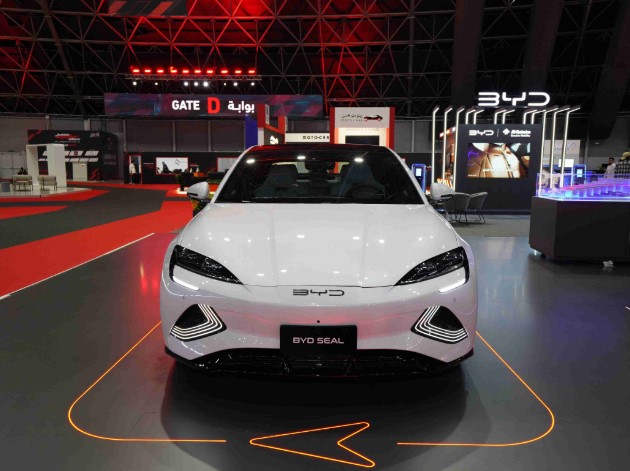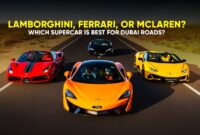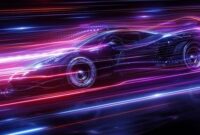2025 Automotive Innovations: New Cars from Hyundai to BYD
Introduction: The Future of Automotive Innovation in 2025
The automotive industry is on the verge of a major transformation, and 2025 is poised to be a pivotal year for the sector. From the rise of electric vehicles (EVs) to the integration of autonomous driving technologies, manufacturers are constantly innovating to meet the demands of a rapidly changing market. At the forefront of these changes are automakers like Hyundai, BYD, and other industry giants, who are unveiling groundbreaking models that embody the future of transportation.
This article will explore the most exciting automotive innovations in 2025, focusing on new cars and technologies from Hyundai, BYD, and other key players. It will highlight the advancements in electric mobility, autonomous systems, and sustainability that will define the next generation of vehicles, and how these innovations are reshaping the way we drive.
Section 1: Hyundai’s Vision for the Future with the Ioniq 7 and Ioniq 8
Hyundai has established itself as a leader in electric mobility with its Ioniq sub-brand, which aims to provide innovative, eco-friendly vehicles. The upcoming Ioniq 7 and Ioniq 8 are set to push the boundaries of EV technology in 2025.
Hyundai Ioniq 7: A Futuristic Electric SUV
The Ioniq 7 is a flagship electric SUV that combines cutting-edge technology with a sleek, futuristic design. With an all-electric platform, the Ioniq 7 is expected to offer a range of over 350 miles on a single charge, powered by Hyundai’s advanced battery technology.
Key features of the Ioniq 7:
• Electric Powertrain: The Ioniq 7 will be built on the E-GMP (Electric Global Modular Platform), Hyundai’s dedicated electric platform. This platform supports high-performance motors, ultra-fast charging, and a spacious cabin.
• Sustainable Materials: The Ioniq 7 will incorporate eco-friendly materials such as recycled plastics and sustainable textiles, reinforcing Hyundai’s commitment to sustainability.
• Advanced Driver Assistance Systems (ADAS): The SUV will feature Hyundai’s most advanced ADAS, including Level 3 autonomy, allowing the car to handle most driving tasks in certain conditions.
• AI Integration: The Ioniq 7 will come with an AI-powered assistant that adapts to the driver’s preferences and habits, ensuring a personalized driving experience.
Hyundai’s Ioniq 7 is a prime example of how automakers are pushing the envelope in terms of electric vehicle performance, design, and technology. It will be a strong competitor in the growing electric SUV market.
Hyundai Ioniq 8: A Luxury Electric Sedan
The Ioniq 8, expected to launch in 2025, is a luxury electric sedan that will compete with high-end models from automakers like Tesla and Mercedes-Benz. The Ioniq 8 will be the epitome of performance, luxury, and advanced technology.
Key features of the Ioniq 8:
• Long-Range Capability: The Ioniq 8 will offer a range of more than 400 miles, making it ideal for long-distance travel without frequent charging.
• Autonomous Driving: With Level 4 autonomy, the Ioniq 8 will be capable of fully autonomous driving in specific conditions, allowing for hands-free operation on highways.
• Interior Technology: The Ioniq 8 will feature a minimalist interior with premium materials and advanced infotainment systems. Augmented reality (AR) navigation and a holographic dashboard will provide an immersive user experience.
• Sustainability Focus: Like the Ioniq 7, the Ioniq 8 will prioritize sustainability, using recycled materials in the interior and offering energy-efficient features to reduce the vehicle’s carbon footprint.
Both the Ioniq 7 and Ioniq 8 demonstrate Hyundai’s commitment to leading the electric vehicle revolution, combining high performance, luxurious design, and cutting-edge technology.
Section 2: BYD’s Push for Global EV Leadership
BYD (Build Your Dreams) has already established itself as a major player in the global electric vehicle market, especially in China. In 2025, BYD’s vehicles will further cement its position as one of the top manufacturers of EVs, with a focus on affordability, range, and innovative technologies.
BYD Seal: A Sleek Electric Sedan with Cutting-Edge Performance
The BYD Seal is an all-electric sedan that combines sleek design, cutting-edge performance, and impressive range. The Seal is part of BYD’s efforts to provide affordable yet high-performance electric vehicles for the mass market.
Key features of the BYD Seal:
• Blade Battery Technology: The Seal will feature BYD’s proprietary Blade Battery, which offers superior energy density, longer lifespan, and enhanced safety compared to traditional lithium-ion batteries. This battery technology allows the Seal to achieve a range of up to 450 miles on a single charge.
• Performance and Speed: The Seal will be capable of accelerating from 0 to 60 mph in under 4 seconds, rivaling performance-oriented electric sedans from Tesla and Lucid Motors.
• Autonomous Driving Features: BYD’s DiPilot system will be available in the Seal, providing semi-autonomous driving capabilities with features like adaptive cruise control, lane-keeping assist, and automatic emergency braking.
• Sustainability: The Seal will incorporate eco-friendly materials, reducing its environmental footprint while providing an advanced driving experience.
With the Seal, BYD is targeting the global market, offering a compelling alternative to other electric sedans and reinforcing its commitment to making electric mobility accessible to everyone.
BYD Tang: A Family-Friendly Electric SUV
The BYD Tang is an electric SUV that combines family-friendly features with advanced technology. Set to launch in 2025, the Tang will cater to consumers who want a practical, high-performance electric vehicle with ample space and cutting-edge features.
Key features of the BYD Tang:
• Large Battery and Long Range: The Tang will feature a large battery capable of delivering over 350 miles of range, making it suitable for family road trips and daily commuting.
• Advanced Driver Assistance Systems: Like other BYD models, the Tang will feature the DiPilot system, offering autonomous driving capabilities for a safer and more convenient driving experience.
• Spacious Interior: The Tang will offer a roomy cabin with three rows of seating, making it ideal for families. It will also include smart infotainment options, including AI-powered assistants and seamless connectivity with smartphones.
• Affordable Pricing: BYD will keep the Tang’s price competitive, making it an attractive choice for families looking for an electric SUV without breaking the bank.
The BYD Tang represents the automaker’s push into the global SUV market, offering an electric alternative to traditional gas-powered family vehicles.
Section 3: Emerging Trends in Automotive Technologies
While the new vehicles from Hyundai and BYD are a big part of the 2025 automotive landscape, the broader industry is also seeing major advancements in technologies that will transform the way we drive.
1. Autonomous Driving: A Step Toward Full Autonomy
In 2025, we will witness significant progress in autonomous driving technologies, with automakers like Hyundai and BYD pushing the envelope in terms of vehicle autonomy. Level 3 and Level 4 autonomous systems will be integrated into production vehicles, allowing cars to drive themselves under certain conditions. These systems will rely on sensors, machine learning algorithms, and 5G connectivity to create smarter, safer vehicles.
By 2025, we can expect to see more vehicles capable of fully autonomous driving on highways, with drivers able to take their hands off the wheel and let the car navigate complex traffic scenarios.
2. EV Infrastructure and Fast Charging: Revolutionizing the EV Experience
A key challenge for the widespread adoption of electric vehicles is the availability of fast-charging stations. In 2025, automakers and governments will continue to invest in expanding the global charging infrastructure, making it easier and faster for EV owners to charge their vehicles. The development of ultra-fast charging technology will enable vehicles to recharge to 80% of their battery capacity in as little as 20 minutes.
This rapid expansion of charging infrastructure will reduce range anxiety and make EV ownership more convenient, contributing to the growth of the electric vehicle market.
3. Sustainability and Eco-Friendly Materials: A Focus on the Planet
Sustainability is no longer just a buzzword; it’s a core focus of the automotive industry. In 2025, automakers will continue to embrace environmentally friendly materials and manufacturing processes. From vegan leather interiors to the use of recycled materials in car construction, vehicles will be designed with the planet in mind.
Automakers will also explore more sustainable energy sources, such as solar panels integrated into the roofs of electric cars to extend range and reduce the carbon footprint.
4. Connectivity and AI-Powered Features: The Smart Car Revolution
As cars become more connected, artificial intelligence (AI) and advanced infotainment systems will play an increasingly important role in shaping the driving experience. By 2025, expect to see vehicles with highly intuitive, voice-activated systems that can understand natural language and anticipate the needs of the driver.
AI-powered assistants will not only help with navigation and entertainment but will also monitor the health and safety of the driver, offering real-time alerts and recommendations for a more personalized experience.
Conclusion: The Road Ahead for Automotive Innovation in 2025
The automotive industry is on the cusp of a new era, with electric vehicles, autonomous driving, and connected technologies poised to redefine transportation in 2025. Hyundai, BYD, and other global automakers are leading the charge with innovative new models that showcase the possibilities of electric mobility, sustainable design, and futuristic technologies.
In the coming years, we will see an increasing shift toward electric and autonomous vehicles, with cutting-edge features like fast charging, AI-powered assistants, and sustainability becoming standard in new cars. The innovations unveiled by Hyundai, BYD, and others at CES 2025 and beyond will shape the future of driving, making it safer, greener, and more connected than ever before.
As the automotive industry continues to evolve, it is clear that the road ahead is electric, autonomous, and smart—ushering in a new era of innovation and sustainability for all.



